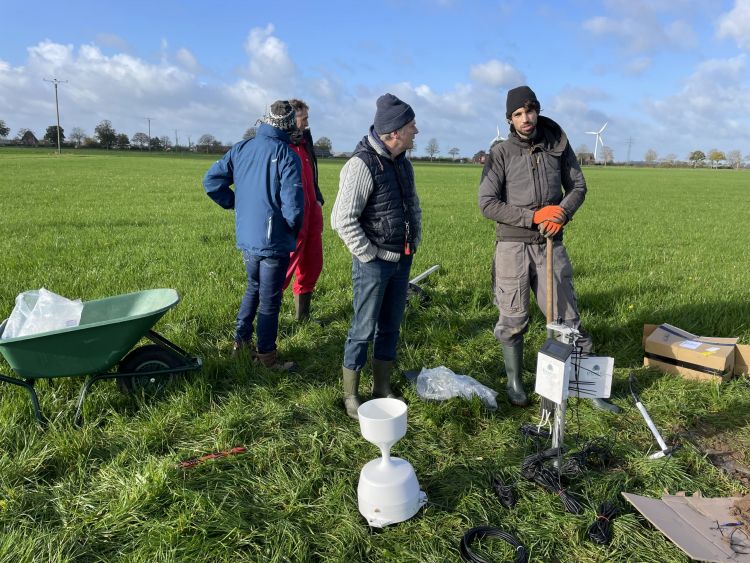LIPS Monitoring Soil Chemistry
Work Package III.II.

LIPS (Laser Induced Plasma Spectroscopy | or LIBS = Laser Induced Breakdown Spectroscopy) is a variant of optical emission spectroscopy (OES) and is used for elemental analysis in solids. The solid to be analysed is excited by a laser, generating an analysis spectrum. The LIPS method is already being used successfully in metal analysis, e.g. for sorting various materials in the recycling industry. However, the devices available on the market do not allow for the precise determination of carbon content or the measurement of organic samples in the soil.
The following challenges arise for the development of LIPS for agriculture:
1. Spectral lines for carbon measurement are in the UV-C range of the light spectrum with wavelengths below 195 nm and are not detectable with standard CCD sensors or PMT sensors. In addition, light from these spectral lines is already absorbed by the air.
2. To generate the light spectrum, the sample material must be excited at high energy. Various types of lasers generate sufficient energy and can be used as an excitation source. However, such lasers can also cause injuries to the skin or eyes.
3. The laser should be mobile and therefore, have a moderate power consumption.
Solution: Develop a novel sensor to which the light is directed via an innovative path so that a sufficient amount of light reaches the sensor. Select a laser source with sufficient energy to excite the sample material while simultaneously posing a low risk to the user, so that the measurement system meets a protection class that allows simple and uncomplicated use, even for farmers. Implement a mobile power supply and smart control of consumption. The development of the LIPS would lead to a versatile analyser that can determine not only the carbon content of soil samples (balance), but also other interesting variables such as toxic elements and heavy metals (lead, arsenic, cadmium, etc.) or the concentration of interesting elements such as sulphur, nitrate, nitrite, and phosphorus. Based on the initial studies by Royal Eijkelkamp, LIPS is being developed for the first time as a product innovation in the form of a practical handheld device for agriculture, supplemented by a standard procedure for sampling, evaluation, and interpretation of the data. The product will be integrated into the database of the soil management system (Soil Health Check) via an interface.
Sub-developments:
– Development of the laser source and the spectrograph (Rheinland Technologie)
– Partial development of embedded hardware and software for the LIPS handheld device, database development (HSRW)
– Development of a demonstrator for field use (Rheinland Technologie,Royal Eijkelkamp)
– Integration of LIPS into the analysis of soil borehole profiles (Royal Eijkelkamp)
– Integrated georeferencing of sampling via GNSS module (Royal Eijkelkamp)
– Testing under field conditions, validation and calibration (Royal Eijkelkamp and Rheinland Technologie, Living Labs)
– Market analysis, business development (RheWaTech, Royal Eijkelkamp)
– Validation and calibration using existing laboratory-based systems
– Preparation of certification taking into account the framework emerging in the MARVIC project for the development of monitoring, reporting and verification systems for assessing carbon stock changes in soils.